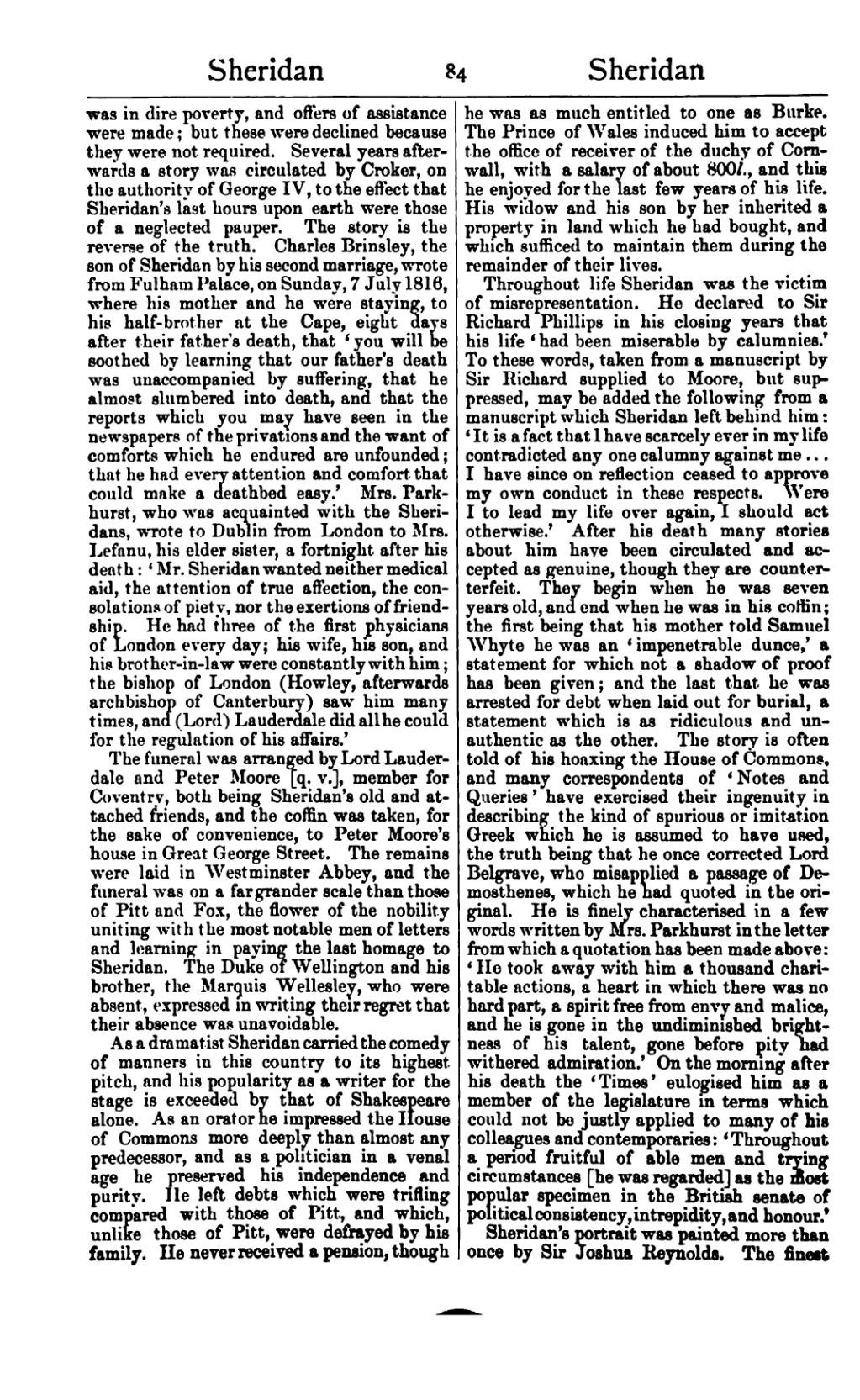was in dire poverty, and offers of assistance were made; but these were declined because they were not required. Sheridan died on 7 July 1816. Several years afterwards the story was circulated by Croker, on the authority of George IV, to the effect that Sheridan died a neglected pauper. The story is the reverse of the truth. Charles Brinsley, the son of Sheridan by his second marriage, wrote from Fulham Palace, on Sunday, 16 July 1816, where his mother and he were staying, to his half-brother at the Cape, nine days after their father's death, that ‘you will be soothed by learning that our father's death was unaccompanied by suffering, that he almost slumbered into death, and that the reports which you may have seen in the newspapers of the privations and the want of comforts which he endured are unfounded; that he had every attention and comfort that could make a deathbed easy.’ Mrs. Parkhurst, who was acquainted with the Sheridans, wrote to Dublin from London to Mrs. Lefanu, his elder sister, a fortnight after his death: ‘Mr. Sheridan wanted neither medical aid, the attention of true affection, the consolations of piety, nor the exertions of friendship. He had three of the first physicians of London every day; his wife, his son, and his brother-in-law were constantly with him; the bishop of London (Howley, afterwards archbishop of Canterbury) saw him many times, and (Lord) Lauderdale did all he could for the regulation of his affairs.’
The funeral was arranged by Lord Lauderdale and Peter Moore [q. v.], member for Coventry, both being Sheridan's old and attached friends, and the coffin was taken, for the sake of convenience, to Peter Moore's house in Great George Street. The remains were laid in Westminster Abbey, and the funeral was on a far grander scale than those of Pitt and Fox, the flower of the nobility uniting with the most notable men of letters and learning in paying the last homage to Sheridan. The Duke of Wellington and his brother, the Marquis Wellesley, who were absent, expressed in writing their regret that their absence was unavoidable.
As a dramatist Sheridan carried the comedy of manners in this country to its highest pitch, and his popularity as a writer for the stage is exceeded by that of Shakespeare alone. As an orator he impressed the House of Commons more deeply than almost any predecessor, and as a politician in a venal age he preserved his independence and purity. He left debts which were trifling compared with those of Pitt, and which, unlike those of Pitt, were defrayed by his family. He never received a pension, though he was as much entitled to one as Burke. The Prince of Wales induced him to accept the office of receiver of the duchy of Cornwall, with a salary of about 800l., and this he enjoyed for the last few years of his life. His widow and his son by her inherited a property in land which he had bought, and which sufficed to maintain them during the remainder of their lives.
Throughout life Sheridan was the victim of misrepresentation. He declared to Sir Richard Phillips in his closing years that his life ‘had been miserable by calumnies.’ To these words, taken from a manuscript by Sir Richard supplied to Moore, but suppressed, may be added the following from a manuscript which Sheridan left behind him: ‘It is a fact that I have scarcely ever in my life contradicted any one calumny against me … I have since on reflection ceased to approve my own conduct in these respects. Were I to lead my life over again, I should act otherwise.’ After his death many stories about him have been circulated and accepted as genuine, though they are counterfeit. They begin when he was seven years old, and end when he was in his coffin; the first being that his mother told Samuel Whyte he was an ‘impenetrable dunce,’ a statement for which not a shadow of proof has been given; and the last that he was arrested for debt when laid out for burial, a statement which is as ridiculous and unauthentic as the other. The story is often told of his hoaxing the House of Commons, and many correspondents of ‘Notes and Queries’ have exercised their ingenuity in describing the kind of spurious or imitation Greek which he is assumed to have used, the truth being that he once corrected Lord Belgrave, who misapplied a passage of Demosthenes, which he had quoted in the original. He is finely characterised in a few words written by Mrs. Parkhurst in the letter from which a quotation has been made above: ‘He took away with him a thousand charitable actions, a heart in which there was no hard part, a spirit free from envy and malice, and he is gone in the undiminished brightness of his talent, gone before pity had withered admiration.’ On the morning after his death the ‘Times’ eulogised him as a member of the legislature in terms which could not be justly applied to many of his colleagues and contemporaries: ‘Throughout a period fruitful of able men and trying circumstances [he was regarded] as the most popular specimen in the British senate of political consistency, intrepidity, and honour.’
Sheridan's portrait was painted more than once by Sir Joshua Reynolds. The finest
